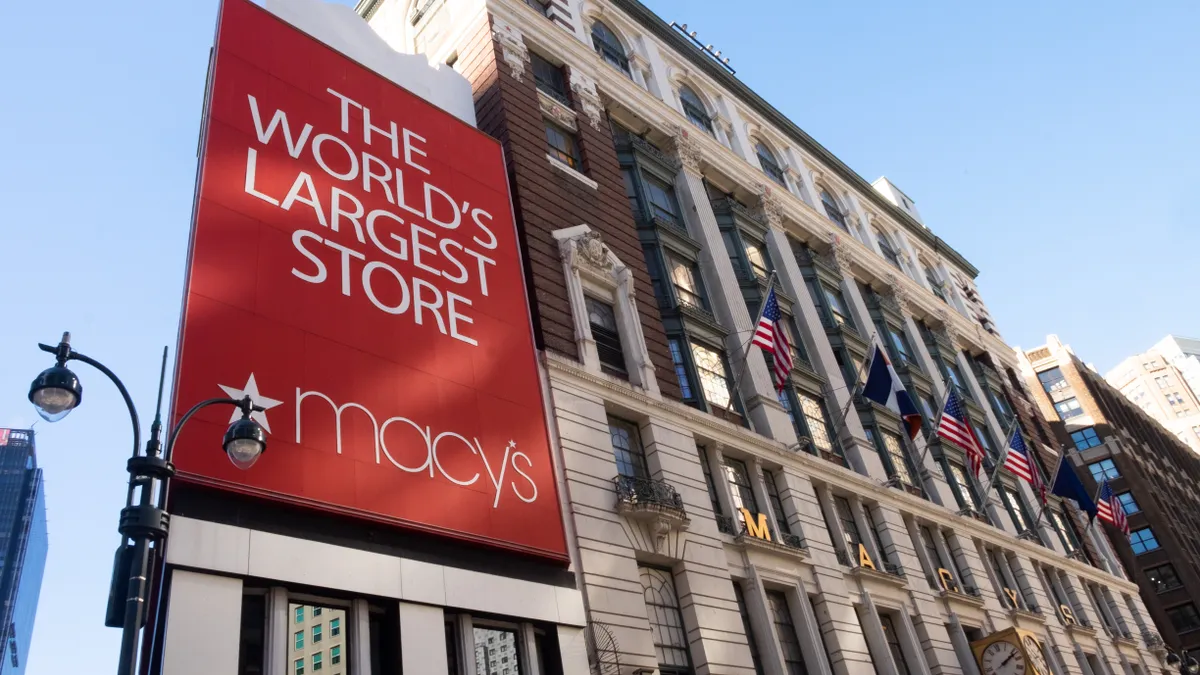Dive Brief:
- Following the lead of other large retailers, Macy's on Tuesday announced that it is raising its minimum wage to $15 per hour and offering a debt-free education benefit, according to a company press release.
- The retailer has already phased in the $15 hour rate "across several markets" and plans to achieve a national rollout by May 2022. Over the summer Macy's enacted pay increases to $15 an hour for all distribution center workers. "Once all these investments are made, average base pay will be above $17/hour and average total pay will be $20/hour," according to the company.
- Macy's will also offer corporate and hourly workers one additional flexible paid holiday so workers can "take a day off on a holiday that is most important to them," per the release.
Dive Insight:
In a tight labor market, Macy's is boosting wages and benefits to win over workers.
Investing in its workforce is also crucial to its Polaris growth strategy. Macy's turnaround effort was unveiled in February 2020 — only a few weeks before COVID-19 forced many U.S. retailers to temporarily shut their doors to stop the spread of the disease. Polaris was momentarily derailed by the pandemic and a sharp decline in apparel sales across the industry. The vision of Polaris has remained, although it is now "updated and accelerated," executives said earlier this year.
While apparel sales have mostly rebounded, and many consumers are expected to return to in-store shopping during the holiday season, retailers are facing staffing shortages. Companies are, therefore, increasing hourly wages and adding benefits to woo potential hires.
Over the summer Walgreens and CVS announced hourly wage increases. Kohl's this fall said hourly store, distribution and e-commerce fulfillment associates are eligible to receive a bonus of up to $400 for working with the company through the holiday season. Amazon increased its average hourly pay to above $18, with some candidates receiving a signing bonus up to $3,000. And on the same day Macy's revealed its hourly increase, Ikea also had an announcement of its own — that it is raising starting wages for U.S. workers to $16 per hour, with some hourly wages starting at $17 or $18, depending on location.
By offering education benefits, which will begin in February next year, Macy's is matching retailers in another area that may be pivotal to retaining staff. The company over the next four years is investing $35 million in the program, which is in partnership with Guild Education. The benefit will be available for all U.S.-based regular, salaried and hourly workers, and will cover 100% of tuition, books and fees for a number of degrees. Options include courses for college prep, high school completion, English language learning, bootcamps, professional certificates and associate and bachelor's degrees within Macy's network.
"As a company, we're driven by our mission to enable our colleagues' success and be the preferred employer everywhere we do business, with competitive pay and benefits rooted in principles of equity," Danielle Kirgan, chief transformation and human resources officer at Macy's, said in a statement. "This program removes a major barrier to accessing education and will help our colleagues to further develop their skills and grow their careers and earning potential."
Walmart similarly announced in 2018 that it would offer financial and academic assistance benefits to its associates. This year the big-box retailer expanded the program, which is also in partnership with Guild Education, by dropping its $1-a-day fee. Walmart attributed the added benefits to a changing economy. "[T]he economy and job market have changed, and Walmart is always looking for new ways to encourage more associates to pursue further education," the company said in a July statement.
Target soon followed with the launch of education assistance benefits for its employees. In a partnership with Guild Education, participants have access to over 250 programs in more than 40 schools, colleges and universities both online and in-person. Target said it is investing $200 million in the program as part of its Target Forward strategy.















